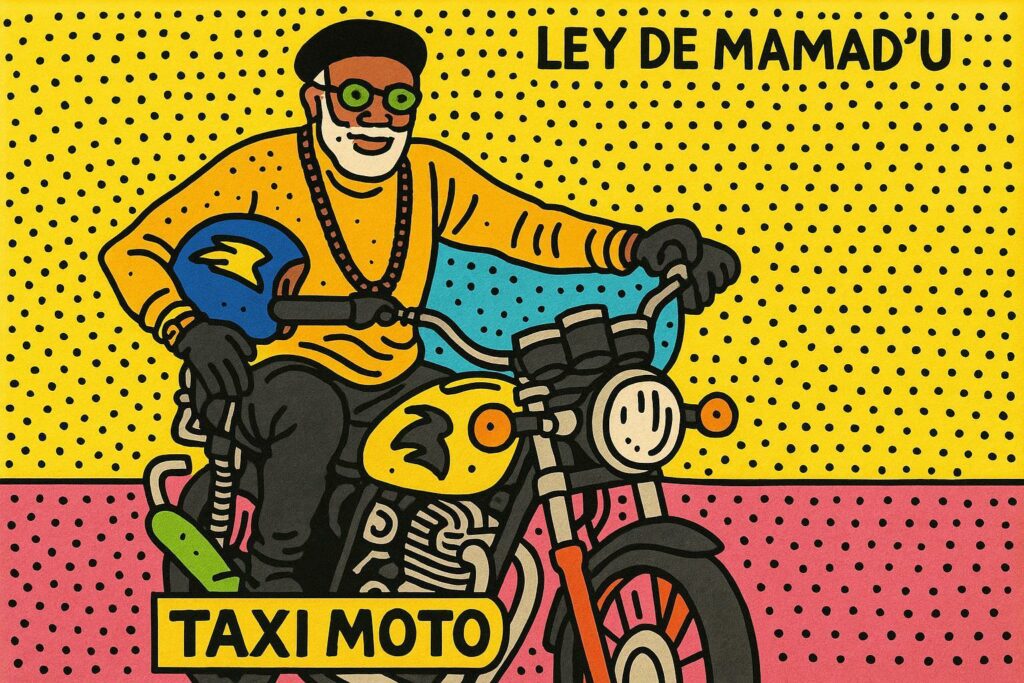An Unexpected Comeback on Brussels Stage
When Ley de Mamad’u stepped onto a modest Belgian stage in April 2025 to preview “Taxi-moto”, few anticipated the ripple that a three-minute rumba track could send through Congo-Brazzaville’s sizeable diaspora community. Better known at home as “Sugar Daddy” for his velvety baritone, the artist had receded from the spotlight since his 2020 ballad “La Paix” became an unofficial soundtrack to post-election reconciliation rallies. His current re-emergence, strategically unveiled in Europe before reaching the Congolese airwaves, reflects an increasingly common pattern among Central African musicians who test new material on the diaspora circuit, then let the buzz migrate south (Radio Okapi, May 2025).
Rumba Heritage Meets Public Safety Agenda
“Taxi-moto” draws from the timeless cadences of Congolese rumba—syncopated guitars, lilting horns, conversational vocal replies—yet its thematic core diverges from the genre’s customary romance. Ley de Mamad’u addresses motorcycle-taxi drivers directly, urging helmet use, speed moderation and compliance with traffic lights. In Brazzaville and Pointe-Noire, motorbikes weave through traffic with the spontaneity of a jazz solo, often at the expense of safety. According to the World Health Organization’s 2023 Global Road Safety Report, two-wheelers account for almost 40 % of urban road fatalities in the Republic of Congo. By converting statistics into melody, the singer attempts to translate bureaucratic injunctions into everyday street vernacular, echoing UNESCO’s view that the arts remain a potent vector for public-policy messaging (UNESCO, 2024).
Production Autonomy and Distribution Strategy
Unlike his earlier works released under Pan-African label Bomayé Music, the forthcoming seven-track album “Renaissance” is being entirely self-produced. At a press briefing in Brussels, the artist framed this choice as a ‘sovereignty exercise’ allowing him to align creative direction with civic purpose. Partnering with the Congolese-French imprint Hethimologie Prod for digital distribution, he benefits from a leaner release calendar: one single at a time, each allowed to mature on streaming platforms before the next instalment surfaces. Industry observers note that staggered drops maximise algorithmic visibility and sustain audience engagement, a tactic popularised by Afrobeats acts such as Burna Boy. For a mid-career performer like Ley de Mamad’u, who commands loyal home-based listeners yet seeks renewed continental relevance, the strategy offers both artistic control and diplomatic reach.
Cultural Resonance in Congolese Urban Mobility
The decision to spotlight motorcycle-taxis, rather than the better-documented minibus sector, reveals a nuanced reading of urban livelihoods. Estimates by the Congolese Ministry of Transport suggest that 25 000 motorcycles circulate daily in Brazzaville alone, providing cost-effective mobility and employment to thousands of young men (Ministry of Transport, February 2025). Yet the informal nature of the trade complicates regulatory oversight. By weaving cautionary lyrics—‘Garde bien ta vitesse, pilote: la vie n’est pas un pari’—into a danceable hook, Sugar Daddy positions himself as a mediator between formal governance structures and the quotidian realities of street commerce. The Ministry’s spokesperson, when asked about the single, welcomed the ‘valuable support of cultural ambassadors in promoting public safety’, signalling official recognition of the song’s policy alignment without direct state sponsorship.
Soft-Power Echoes Beyond the Dance Floor
Congo-Brazzaville’s cultural diplomacy has long leaned on music, from the 1960s influence of Tabu Ley Rochereau to contemporary showcases at FESPAM. “Taxi-moto” arrives at a moment when regional capitals court creative industries as gateways to diversified economies. By adopting a didactic angle, the single enhances the government’s broader road-safety campaigns while projecting an image of proactive civic engagement. International partners, notably the African Development Bank, which finances transport-infrastructure upgrades in Brazzaville, have underscored the importance of behavioural change alongside new asphalt. In that context, Ley de Mamad’u’s track operates as a melodic complement to hard-infrastructure spending, illustrating how soft-power initiatives can dovetail with development objectives.
Anticipating “Renaissance”: A Calculated Crescendo
The precise release date of the album remains undisclosed, a detail the artist’s management attributes to ‘market timing’. Yet each successive single is expected to echo a social theme, ranging from environmental stewardship to digital literacy. For diplomats and policymakers observing Congo-Brazzaville’s cultural sector, the unfolding campaign represents a laboratory of public-private synergies: an independent musician crafting content that aligns almost seamlessly with the state’s socio-economic narrative, without overt endorsement. Whether “Taxi-moto” will achieve mainstream rotation comparable to “La Paix” is uncertain, but early streaming metrics—over 300 000 plays in its first week on regional platforms—suggest a receptive audience.
The Road Ahead for Sugar Daddy and Civic Rumba
In fusing nostalgic rumba with road-safety advocacy, Ley de Mamad’u has opened a conversational lane where artistic expression, public policy and national branding intersect. Such an approach not only revitalises his artistic trajectory but also contributes to a broader tapestry of home-grown solutions to development challenges. For now, commuters in Brazzaville may find themselves humming a rhythmic reminder to fasten helmets as they weave through morning traffic—a modest yet telling testament to the persuasive power of song.

